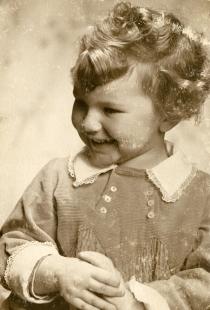The grave of Emilia Leibel’s husband Juliusz in Koz'modem'yansk
This is a picture of my husband’s grave in Koz'modem'yansk, USSR, where we were deported during the war. Julek died in 1944. He was only 48. There was no Jewish cementary to bury him.
When war was about to break out we went east, and ended up in Lwow for a while. I don't know when exactly it was that they deported us from Lwow, but it was no longer winter. It was March, April 1940. We were traveling for a terribly long time. About 3 weeks. They would stop for a moment, sometimes in the day, sometimes at night, so that people could jump out to relieve themselves. We were taken to this port on the Volga, this small town. I don't remember the name. From there we sailed all night by ship to Koz'modem'yansk [approx. 150 km. from Kazan]; that was a very nice port on the Volga, and there was a railroad station there. That was in the Mariy El Autonomous Soviet Republic [in December 1941 there was a Polish population of 4,000 there]. Apparently 500 people arrived with us on that train. Later that same day we were taken 35 km into the forest.
Men and women worked in the forest. My husband worked, my husband's brother, and Irena - his niece. She had just passed her school-leaving exams. Yes. I mean, women didn't fell trees, they just sawed branches or felled trees into smaller blocks, and then stacked the blocks. I had a small child, and there were the in-laws, elderly people, so I didn't have to work in the forest. Neither did my husband’s sister Giza, because she was… I don't know how old. Over 50. Later on, by coincidence, my cousin Maurycy Wiener was also deported to Koz'modem'yansk, and worked in the same gang as my husband.
My husband was chopping wood for a factory. And one time he mentioned to his director that I wanted a job. What we wanted was for me to have the right to exist there, to have a bread ration. And that director, a woman, hired me first of all as a gardener. I had no idea about gardening! They showed me the shears and told me to cut the tomatoes as they started to ripen. So I spent maybe 2 weeks on the tomatoes. Then my director said that I wasn't going to be in the garden, but in the mill. I spent half a day there theoretically getting experience. They taught me which grain was for what - before that I knew next to nothing. What it was called, what my title was at that mill? I can't remember. I was paid well, every week I would get a small bag of flour, every Saturday. That was a fortune. There was a free canteen.
My husband contracted heart problems. He worked very hard. Before that he'd been a physically healthy, handsome man, but chopping wood in a forest in sub-zero temperatures..., and what kind of nourishment did we have? I called a doctor, his grandfather had been a Polish exile, and he was 3rd-generation, still understood some Polish. A very decent man. What was his name? I can't remember. Because he saw the conditions we were living in, he took my husband into the hospital. There were no patients on the men's ward at all, just one patient and my husband the second, because there was a war on and all the men were at war. He was in hospital for a long time, and in the end, the doctor said to me: 'Take him home, because he won't live.' He died in March 1944. He was buried in a Russian cemetery. No, it wasn't a Jewish cemetery. It was this neglected cemetery, a few people died, so they were buried there. The cemetery wasn't looked after very well there.



















